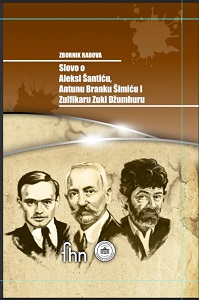
We kindly inform you that, as long as the subject affiliation of our 300.000+ articles is in progress, you might get unsufficient or no results on your third level or second level search. In this case, please broaden your search criteria.


The paper is based on the fact that, within the literary criticism, Aleksa Šantić has been recognized as a poet/bard of patriotic-social engagement, motifs from Muslim life and Mostar, as well as elegiac tones of personal misfortunes. In those social circumstanses (the Austro-Hungarian occupation, the annexation) Šantić’s Herzegovinian identities in patriot-social poetry are being represented as political identities, supported by essentialist valuables: the nation, the space, the epic tradition, myths and religion, which, on the basis of distinction WE/THEY, homogenizes „the identity of resistance“. Herzegovina is an imaginary space of cultural memory, whilst Mostar represents an authentic space of Šantić’s life and a place in which cultural context his constructive identities are being formed. It is a place of encounters with people, recognizable climate and topographic marks, Mediterranean vegetation, urban bazaar and streets, as well as family-patriarchal milieu. Inside that space Šantić has sang/lauded amorous, landscape and elegiac songs, his experiences of Mostar, specific culture of life and sensation of connection and being affiliated. Identifying himself with the people’s mentality, Šantić has transmitted poetic impulses of the city’s soul and spirit
More...
The paper deals with the role and position of Aleksa Šantić’s poetic oeuvre in the literary canon of both Bosnian-Herzegovinian and Serbian literatures in Bosnia-Herzegovina, as well as Serbian literature as a whole and Yugoslav literature. Special attention was paid to the early reception of Šantić’s poetic work, while emphasizing the discrepancy between local and broader understanding of the character and value of the author’s poetic oeuvre. In this way, the paper points to the complex process of canonization of the poetic work of A. Šantić, but also the possibility of its understanding today, particularly in terms of respecting poetics and politics of culture of the author’s time.
More...
Šantić is one of the first Bosnian poet who promoted the sonnet form at the earliest 20th century in this region. From 1890 when was published his first sonnet, to the latest verses, Santić did spoke thru the form of sonnet about all topics that occupied his attention as a poet and as a man, but not always with the same dynamics. In the initial stage of his creation sonnets are just side form in which he tried his hands. In the period from 1905 to 1914 they become the center of his work, and at the final stage the interest for this form was decreasing. The paper examines how much did solid sonnet form had impact on the poetry of the poet, and vice versa, how did poet change form trying to adapt it to his own expression.
More...
„Hasanaginica“ , one of the most representative texts of Bosnian – Herzegovinian literary tradition, functions as a poetic challenge for many poets. Aleksa Šantić was inspired by ballade`s emotional qualities and he used its poetical potentials to made drama Hasanaginica. Šantić tries to present dramatical picture of a legend that functions as a synonym of our oral tradition. Following the traditional stereotypical fable of the ballade, with a few real episodic characters of the time, Šantic remains consistent in sketching the main actors and their expected actions. On the other hand, the poetic melodrama that is projected onto the aggregated monological forms, and the drama’s main character’s pathetic sentiments, in its exaggerated nature, poetically predetermines Šantić’s attitude towards the writing of the dramatic text.
More...
This text examines various methodical approaches to the writer and his literary work. It indicates a possibility of linking different aspects of Aleksa Šantić’s life and poetry, and in addition to traditional approaches, among which the literary history has an unavoidable part, it also introduces a rich intertextual and intermedial context in the methodical interpretation, which appears as an exceptional possibility in student motivation for reading and experiencing the poetry of Aleksa Šantić.
More...
The focus of this scientific work is about reviewing thematic motives that is present in a Santić poetry. This work also includes linguistic analysis of verse expression, respecting imposing stylistic aspects feature and virtue of the voice repeating, literally and deeper figuratively meanings, performance of rhythm specificity based on syllables verification of tone, and intonation-syntactical arrangement of the text. Emphasized is on an impressive and expressive characteristic elements and effects of the poetry.
More...
Given that inadequate use of cases/prepositions leads to a change in the meaning of the entire phrase, the task of the research at hand is to determine the use of accusative which functions as spatial determiner. The research is based on a corpus which comprises selected short stories by Aleksa Šantić, given that his works have been shown to be suitable for this kind of research. The aim of the paper is to define the prepositions in question using the morphosyntactic and the semantic methods, as well as to determine the frequency of prepositions used to define accusative as a spatial determiner.
More...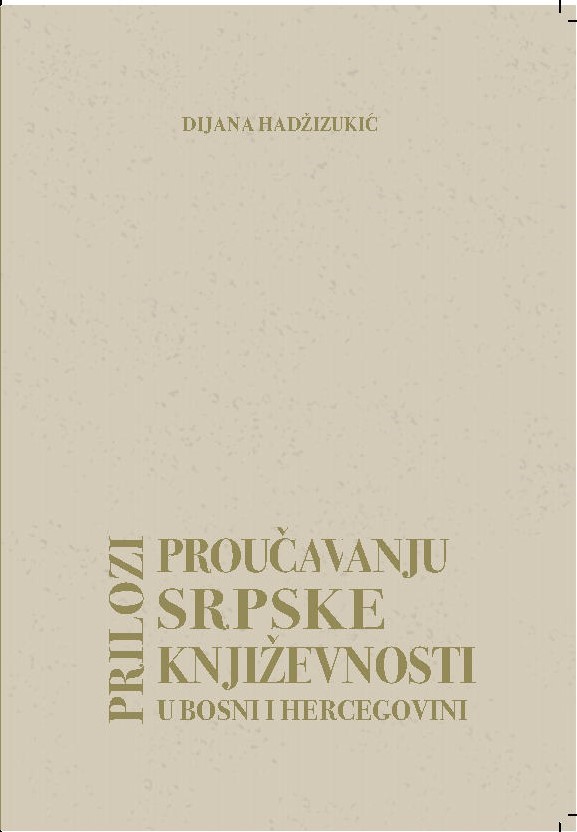
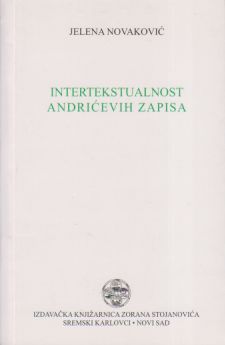
Citati koje je Andrić uneo u svoje beležnice upućuju na fenomen intertekstualnosti shvaćene, kako čitamo u Ženetovim Polimpsestima, kao "relaacija istovremenog priststva dvaju ili više tekstova", kao "efektivno prisustvo jednog teksta u drugom", čiji je eksplicitni oblik citat, a implicitni aluzija. Andrić je, međutim, mali broj zabeleženih citata uneo u svoja dela, dok je najveći broj ostao samo u obliku odvojenih zapisa u sveskama. Tekst u koji bi se oni uključili nije nikada napisan, ali bi se mogao vaspostaviti njihovim smeštanjem u dvostruki kontekst što ga predstavljaju misli njihovih autora i misli samog Andrića, koji se kroz njih na posredan način izražava.
More...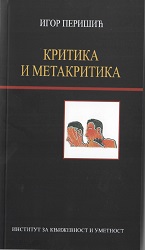
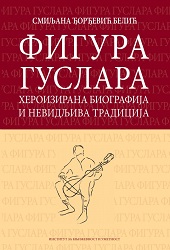

The monograph, The Moon Grammar - Identity and subjectivity in Doctor Faustus by Thomas Mann and The Damned Yard by Ivo Andric researches the subject of identity and the relation between subjective and objective, individual and collective, which are the focal points in contemporary anthropology, as well as in narratology with a distinctive difference that narratology is focused on the status and identity of the narrator and diversory relationship between the narrator and the narrative text. In this research the narrative analysis is used to outline the anthropological implications of the literature that was read from the narrative structure in Doctor Faustus by Thomas Mann and The Damned Yard by Ivo Andric. This indicates that the anthropological reading of literature could be based on analyses of the formal characteristics of the literature allowing the intentionality of a literary text. In the literary texts the intention is entangled with the way of structural expression because it activates and exploits the intentional potential of the language. Due to this reason we have concentrated on establishing the intentional structure in Doctor Faustus and in The Damned Yard through a narrative analysis to achieve a more thorough reconstruction of extensional structure of the narrative world and its distinctive anthropology, especially when the subjects of identity and subjectivity are analysed. Both literary works address aesthetical, ethical, religious, ideological, sociological and existential questions. On the aesthetical plane, after the fall of the totalitarian ideologies, the art displays symptoms of general intellectual climate. This period is characterised with criticisms of humanistic values of mind, objectivity of science and progressive ideas, including the traditions of Enlightenment. These literary works can be read as indicative announcements of postmodern suspicion in the human being as a self-identifying subject and as a forecast of contemporary crisis of identity. The result that these social, cultural or spiritual events have brought us could be characterised as alignment, problematizing or even eradication of identity borders of personality or as explicit continuation of Thomas Mann’s – Moon-grammar. Polyphonically organised narrative is analogue to the eradication of identity borders of personality, which sense is in displacement of monological unity of the narrative subject with itself regardless of the primary style of narration (from 1st person to 3rd person).
More...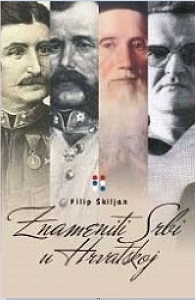
Srbi u Hrvatskoj nisu imali prilike upoznati se sa svojim znamenitim pripadnicima, a koji su na različitim područjima – religiji, umjetnosti, nauci, književnosti i politici – zadužili ne samo narod iz kojeg su potekli, ne samo Hrvatsku iz koje su potekli u kojoj su živjeli i stvarali nego i svijet kojem su svojim djelovanjem, stvaranjem i spoznavanjem doprinosili. Oni sami po sebi zavređuju da o njima održavamo i širimo znanja. Za Srbe u Hrvatskoj oni su važna mjesta identiteta i važna uporišta za njihovu integraciju u hrvatsko društvo. Upoznavanje ne samo Srba sa znamenitim Srbima iz Hrvatske veći i cijele Hrvatske neophodna je pretpostavka i za to da imamo drugačiju Hrvatsku, otvorenu za razlike, otvorenu za svoje veličine neovisno o tome koje su etničke ili vjerske pripadnosti. Hrvatska u kojoj ne bi bilo mjesta ne samo za Preradovića, Teslu i Desnicu, nego i za Rajačića, Milankovića, Runjanina, Viteza, Petrovića, Pribićevića, Nikoliša, Bakića i Mrkalja, ne bi bila Hrvatska otvorena za svoje sugrađane srpske nacionalnosti, niti bi bila Hrvatska koja bi živjela u skladu sa bogatstvom svojeg povijesnog i sadašnjeg identiteta.
More...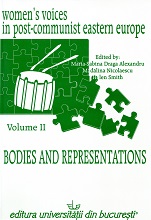
The first novel by the contemporary Serbian woman author Ljubica Arsić, Čuvari kazačke ivice (Guardians of the Kazak Border), was published in 1988 and reprinted in 1997 and 2002. However, due to a set of various unfavorable circumstances, it remained almost unknown to a wider audience until the second reprint. The novel’s relative unfamiliarity may partly be attributed to the fact that at the time of its first publication there existed no appropriate theoretical language or framework to adequately account for its nomadic spirit. Unlike Guardians of the Kazak Border, Arsić’s second novel, Ikona (Icon), published in 2001, aroused immediate interest amongst readers, critics and the media, winning one prize when only in draft and another after publication. There was a lapse of thirteen years between the publication of these novels, during which time important political, ideological and economic changes took place. Although it seems tempting to ascribe the differences between them to this fact, the situation is much more complicated and interesting.
More...
In Yugoslavia during the time of communism and atheism the main (Orthodox) religion and its customs were effectively banned. After communism ended there was a revival of Serbian traditions and customs. Today much poetry in Serbia is characterised by the return to the use of archaic language and religious and mythic motifs. Women poets on the other hand tend to use contemporary (even colloquial) language and are interested in the individual rather than mythic or religious figures. They write outside the institutions of cultural power and are liberated from these conventions, they create freely, are open to the world and prepared to break away from patriarchal norms. They are willing to shed taboos. Even when they do use traditional symbols, they often change their meanings.
More...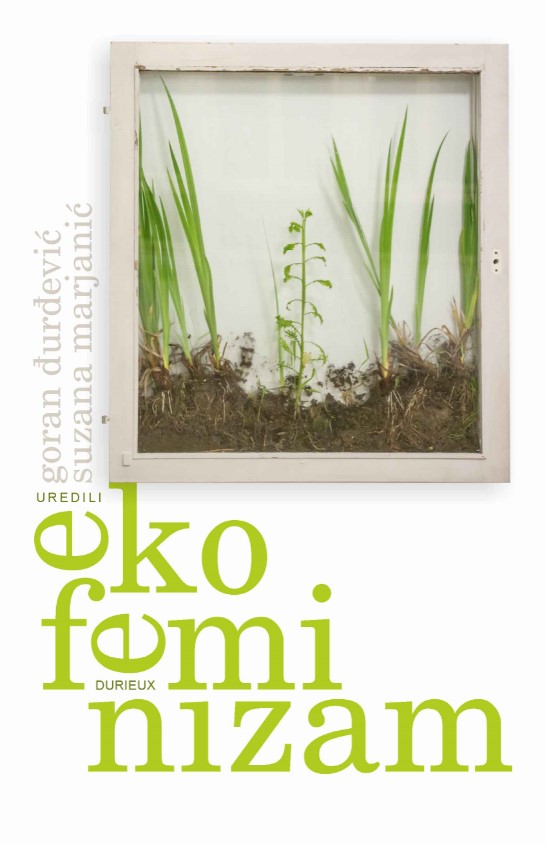
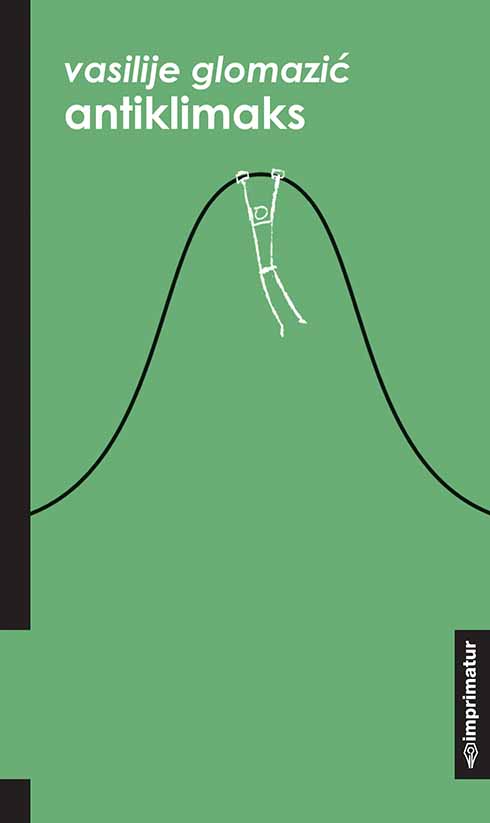
The talented Slobodan Karl lives and writes anticlimax. For fifteen years he has been trying desperately to write “the best novel in the world” by which he will cross the self-imposed limit and call himself a writer - a man who lives exclusively from writing. As a guide for weekend trips, he turns interesting ideas into weak endings, and in relation to people - impressive first impressions into disappointments. Slobodan is convinced that in order to turn his talent into success, he needs material security and time, which exist in his life as mutual exclusivity. Uncertain, he finds solace in superficial relationships. When his life is further complicated by the divorce and the condition of his son, Slobodan is ready to do what he can do best - write another average novel that no one needs, least of all. A chance meeting with Dušan Jadrančić, a self-proclaimed risk trader and a man of seemingly vague intentions, will initiate a series of emotional and structural changes in Slobodan that will bring him to the brink of success.
More...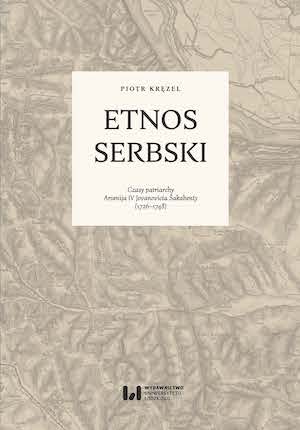
The main purpose of this monograph was a multiperspective look at the fate of the Serb population in a time, when patriarch Arsenije IV Jovanović Šakabenta (1726–1748) was its undisputed leader. It was a crucial moment in the history of the Serbs, due to the shift of focus in their spiritual and political life from Peć to Karlovci. For the Serbian community, who did not have its statehood then, it was undoubtedly a particularly significant event. The problems of the Serbs in the first half of the 18th century have been presented against the background of crucial events of the general history of the period. These include, among others, “the Tulip Period” in the Ottoman Empire (1718–1730), the Austrian-Turkish war (1737–1739) and the War of the Austrian Succession (1740–1748). The monograph is based on the lesser known sources which were collected during archival and library research in Serbia, Austria, Croatia and Russia.
More...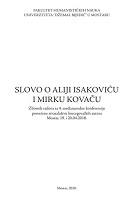
Mirko Kovač je jedan od najistaknutijih predstavnika postmoderne književnosti na južnoslovenskom semiotičkom prostoru, koji je iza sebe ostavio izuzetno obiman i žanrovski razuđen stvaralački opus. Budući da se radi o međunarodno priznatom piscu, čije je stvaralaštvo više puta nagrađivano i od književne kritike hvaljeno, izuzetno je značajna pojava ovog Zbornika naučnih radova koji će u znatnoj mjeri rasvijetliti Kovačevu hermetičnu poetiku.
More...